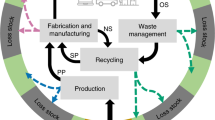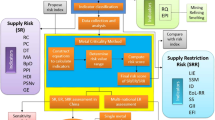Abstract
PROF. CARPENTER, in his article on “Munition Metals” in NATURE of July 15, gives estimates of the resources of the enemy countries in the metals required for war purposes. This information will doubtless prove of great value, especially to those whose duty it is to study the weak points in the armour of our enemies and to devise methods of accentuating those weaknesses; it is consequently desirable that the information so gathered together should be as accurate as possible. In summing up, Prof. Carpenter states that the enemy countries can certainly produce five out of the ten metals considered, without having recourse to imports, these five being iron, manganese, chromium, zinc, lead; whilst he regards it as doubtful whether they can produce from domestic sources sufficient of the remaining five metals—nickel, copper, aluminium, tin, and antimony.
This is a preview of subscription content, access via your institution
Access options
Subscribe to this journal
Receive 51 print issues and online access
$199.00 per year
only $3.90 per issue
Buy this article
- Purchase on Springer Link
- Instant access to full article PDF
Prices may be subject to local taxes which are calculated during checkout
Similar content being viewed by others
Author information
Authors and Affiliations
Rights and permissions
About this article
Cite this article
FERMOR, L. The Manganese-Ore Requirements of Germany. Nature 96, 170–172 (1915). https://doi.org/10.1038/096170b0
Issue Date:
DOI: https://doi.org/10.1038/096170b0
Comments
By submitting a comment you agree to abide by our Terms and Community Guidelines. If you find something abusive or that does not comply with our terms or guidelines please flag it as inappropriate.



